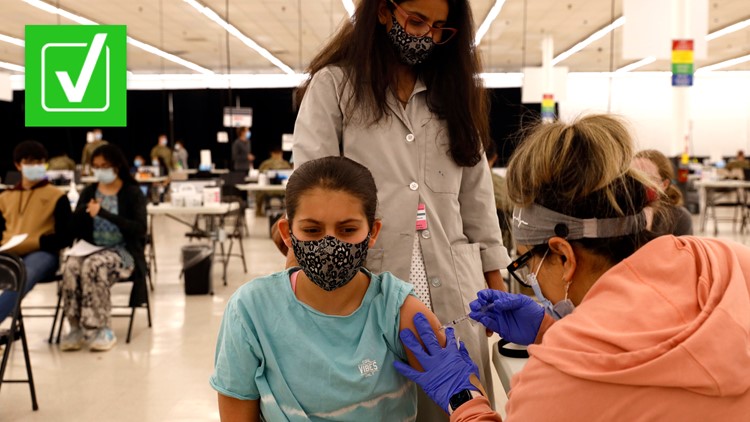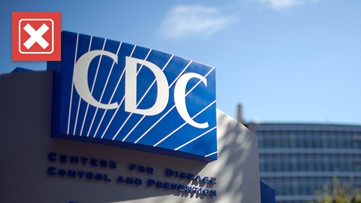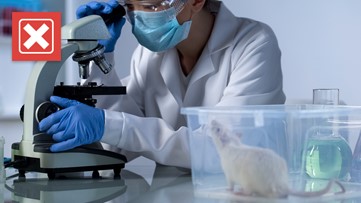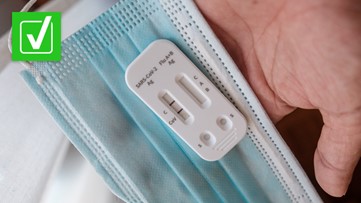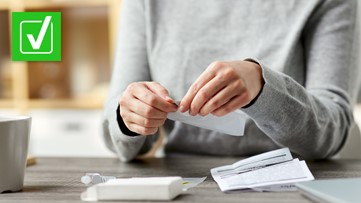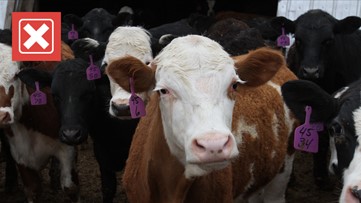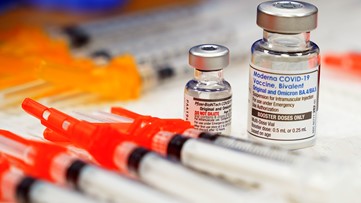The Pfizer COVID-19 vaccine is now authorized in the U.S. for children as young as 12. The other COVID-19 vaccines, developed by Moderna and Johnson & Johnson, are still only authorized for people 18 and older. But that could change soon.
Pfizer and Moderna are testing their shots on kids as young as 6 months old. So, as more young people get the all-clear to get a COVID-19 vaccine, questions are arising.
The VERIFY team answered your questions about kids and COVID-19 vaccines this week as part of our “VERIFY Weekly” feature. Watch the video on our YouTube page here.
THE QUESTION
VERIFY viewer Ty from Arizona asked: If you’re under 18, do you need parental permission to get the vaccine?
THE SOURCES
- American Academy of Pediatrics
- Dr. Payal Kohli, assistant clinical professor of medicine at University of Colorado Anschutz medical campus.
THE ANSWER
Whether someone under 18 needs parental permission to get a COVID-19 vaccine depends on where they live. The only exception to this is for emancipated minors, who are legally independent from their parents and don’t need adult consent for medical decisions.
WHAT WE FOUND
The American Academy of Pediatrics says, “State and/or local laws determine who is able to consent or assent for COVID-19 vaccine; the same as other vaccines. In most places, a parent’s consent is required for an adolescent to receive a vaccine.”
Dr. Payal Kohli, assistant clinical professor of medicine at the University of Colorado Anschutz medical campus, said the laws are meant to protect children.
“This is really intended as a protection for the kids or teen, not to limit their liberties but actually to protect them,” she said.
In Ty’s home state of Arizona, anybody under the age of 18 must have parental consent before getting their shot.
But some states do have limited exceptions. In North Carolina, for example, state law allows people ages 16 and 17 to give consent to medical services for the treatment and prevention of communicable diseases, including COVID-19.
Each state’s health department should have information about its rules regarding parental permission.
THE QUESTION
Should kids get vaccinated against COVID-19?
THE SOURCES
- Dr. Tina Tan, professor of pediatrics at Feinberg School of Medicine of Northwestern University and infectious diseases attending physician at Lurie Children’s Hospital of Chicago.
- Dr. William Schaffner, professor of health policy and preventative medicine at Vanderbilt University.
THE ANSWER
Yes, kids should get vaccinated for their own health and the safety of the community.
WHAT WE FOUND
While kids are less likely to die from COVID-19, that doesn’t mean they don’t experience serious symptoms. At least 15,000 children have been hospitalized with COVID-19, according to the American Academy of Pediatrics.
“We've seen kids as young as 3 months of age hospitalized with COVID -- in an intensive care unit, on a ventilator. And they got the COVID from one of their family members,” said Dr. Tina Tan, professor of pediatrics at the Feinberg School of Medicine of Northwestern University and an infectious diseases attending physician at Lurie Children’s Hospital of Chicago.
Plus, the newest CDC data shows more COVID-19 cases among children under 18 than seniors over 65.
Experts estimate to reach herd immunity, or something close to it, roughly 70-90% of Americans need to be vaccinated. And U.S. Census data shows kids under 18 make up roughly 22% of the U.S. population.
The bottom line is in order to beat COVID-19, vaccinating kids needs to be part of the solution.
“Let's protect as many children as we can, as quickly as we can,” said Dr. William Schaffner, professor of health policy and preventative medicine at Vanderbilt University. “It works for measles. It works for polio, why are we hesitant for COVID?”
THE QUESTION
Will kids get the same COVID-19 vaccine dosage as adults?
THE SOURCES
- Spokespeople for Pfizer, Moderna and Johnson & Johnson.
THE ANSWER
Yes, as of May 14, teenagers will get the same dosage of the COVID-19 vaccine as adults.
WHAT WE FOUND
A spokesperson for Pfizer said the vaccine "is the same formulation and administered at the same level as adults in a two-dose regimen, 21 days apart.”
A Moderna spokesperson told VERIFY its adolescent vaccine, which is still undergoing trials, is the “same vaccine, same dose.”
Johnson & Johnson just started its trial for children 12 and older. At this point, we don’t know if they’ll adjust the dosage for kids.
THE QUESTION
Are teens experiencing similar adverse reactions to the COVID-19 vaccine as adults?
THE SOURCES
- Centers for Disease Control and Prevention (CDC)
- Pfizer
THE ANSWER
Yes, adolescents are reporting similar adverse to the COVID-19 vaccine as young adults. But some have reported more severe symptoms.
WHAT WE FOUND
Some of the most common COVID-19 vaccine side effects across all age groups include arm pain, fatigue, headaches, muscle and joint pain, chills and fever. The CDC says those vaccine reactions are “normal signs that your body is building protection and should go away within a few days.”
Pfizer’s results found that the vaccine was “well tolerated [in adolescents], with side effects generally consistent with those observed in participants 16 to 25 years old.”
A Pfizer spokesperson told VERIFY that on top of those usual reactions, some adolescents reported more frequent and intense reactions, saying, “In our clinical trial the frequency and severity of adverse events were higher in the younger age groups than the older age groups."
Dr. Schaffner says for most people, the pros outweigh the cons.
"They come and go, and they’re gone within 48 hours,” Dr. Schaffner said. “What we want to do is keep those side effects to a minimum but still get protection ... they're much better than having your child be very, very sick in an intensive care unit."
More from VERIFY: No, the U.S. COVID death toll has not hit a pandemic low
VERIFY
Our journalists work to separate fact from fiction so that you can understand what is true and false online. Please consider subscribing to our daily newsletter, text alerts and our YouTube channel. You can also follow us on Snapchat, Twitter, Instagram or Facebook.

